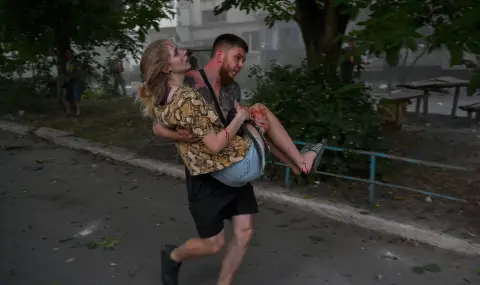„It is very difficult to leave your home. The fear of going to another city is greater than the fear of death," Gennadiy Yudin, a police officer from the "White Angel" evacuation group, told DV. He and his colleagues work in Mirnograd, a mining town in the Donetsk region, southwest of occupied Avdeevka.
The Russian army is getting closer and closer to Mirnograd. The front line is now less than 10 km away, the city is under constant shelling. According to the information of the city authorities, of the population of Mirnograd, which was 47,000 people, there are no more than 2,000 left. “The White Angel" evacuates people with an armored van, inside there are bulletproof vests and helmets for the children and adults. As Yudin explains: “There are almost no children left in the city - there are two families with children who are also preparing to leave.
The officers from “The White Angel" are touring homes whose owners have agreed to evacuate. The first of them is not at home, and the second did not wait for the policemen - he went on foot to the station in Pokrovsk, from where the evacuation trains depart. A woman appears on the street, not in the best of spirits, and says that although she bought a ticket, she doesn't want to leave. “Yes, it is scary here. But I'm also afraid to leave. A foreign country is a foreign country." The woman thanks the evacuation team, who wants to help her, and leaves.
Evacuation by trains
According to information from the city authorities in Pokrovsk, there are 26,000 people left out of the 60,000 population, of which over 1,000 are children. In the morning, the city looks lively - locals walk the streets, market stalls are full. Saleswoman Natalya says she will think about evacuation only after selling her goods. “And where should I go? Not everyone has money to rent a home." The buyer Sergey says that he does not plan to evacuate, but “the child must be saved".
In the afternoon, people at the station get up more. The elderly couple Vladimir and Galina are waiting for the train that will take them to a village in the Dnipropetrovsk region, where they have rented a house. “They are betraying our city and that is very unfortunate," says Galina.
„And I, will I last?", 80-year-old Love, sitting in the waiting room, asks in turn. She is afraid of the long journey - the evacuation train travels to Lviv for 24 hours. “Who will bury me?", sighs Love.
On the platform, rescuers and volunteers help people with reduced mobility to board the train. "I'd rather be killed - I don't want to be disabled," says 85-year-old Lyudmila, who is traveling with her daughter Nelya and her 85-year-old mother-in-law Ekaterina. “We decided to leave because it is very noisy and because the police have already called us - because of my 17-year-old son." The son, as well as the older daughter, are already waiting for their mother and grandmothers in Kiev. The family will then go to Finland. “It is very sad to leave the place where you were born and grew up,", Nelya points out.
Some remain
Student Victoria also gets on the train, but her mother Svetlana stays on the platform. He's crying because he wants to leave too. "However, we have to stay for another month - to take the harvesters to the field, to sell the cows," the woman explains. She is sorry to leave the family farm, but understands that it is dangerous to stay.
A man remains on the platform and sends his wife and son - he does not leave to work in the mine until it is closed.
The evening class in Pokrovsk starts at three in the afternoon. Therefore, after the departure of the train, the city is suddenly deserted. Only occasionally do military and police vehicles pass. In front of the destroyed buildings there are flower gardens here and there. “At the time, it was a lively and very beautiful city, the most beautiful,", Dmitri told the DV team, who is building himself a trailer to transport his belongings. His wife and their 18-year-old daughter have already evacuated. He himself claims that he will also leave soon, but he admits that he only deals with the things so that he can find work and stay at home longer. “My roots are here", says the man.
Author: Anna Sokolova
